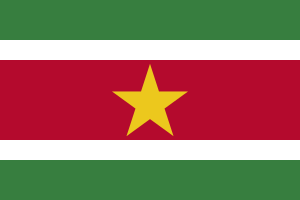Ramsewak Shankar
Ramsewak Shankar (born 6 November 1937) is a Surinamese politician who was the 4th President of Suriname, serving from 1988 to 1990.[2] His government was overthrown by Dési Bouterse leading a bloodless military coup. Shankar had previously served as Agriculture & Fisheries Minister from 1969 to 1971.
Ramsewak Shankar | |
|---|---|
रामसेवक शंकर | |
| 4th President of Suriname | |
| In office 25 January 1988 – 24 December 1990 | |
| Vice President | Henck Arron |
| Preceded by | L.F. Ramdat Misier |
| Succeeded by | Ivan Graanoogst |
| Personal details | |
| Born | 6 November 1937 Nieuw Amsterdam, Suriname[1] |
| Political party | VHP |
Shankar is a member of the large ethnic South Asian community in Suriname. He had studied at Wageningen University in the Netherlands.[3] After his return to Suriname, he became active in the Progressive Reform Party. He supported independence in 1975.
Career
Shankar was elected as President by the National Assembly after a parliamentary election was held in November 1987.[4] The ruling military regime had led the National Assembly to adopt a new constitution, which permitted coup leader Dési Bouterse to remain as head of the army.[5] Ramsewak Shankar was a former agriculture minister and succeeded Ramdat Misier as the President of Suriname.[4] The Shankar government initially gained the full support of the National Assembly.[6]
In 1989 the Treaty of Kourou, a ceasefire agreement between the Jungle Commando and the Surinamese army, was signed.[7] Shankar agreed to pardon the Maroons who had been waging the civil war against the military in an effort to preserve their autonomy within their traditional territory in the rain forest. He discussed the possibility of their members keeping their arms in the interior.[8] On April 1989, a general amnesty was passed for violence committed during the civil war, but not for human rights violations which had mainly been committed by the National Army.[9] Dési Bouterse and the National Democratic Party opposed the agreement,[8] calling it a violation of the constitution. Nevertheless the National Assembly approved the Kourou Agreement with a large majority.[10]
In December both Bouterse and Shankar were on an international trip, and made a stop over in Amsterdam Airport Schiphol. Bouterse was not allowed to leave the security area by the Dutch military police while Shankar could pass, and received full access to the gathered press. On 21 December, Bouterse attacked Shankar on his return in Suriname for failing to protest.[11] The next day, Bouterse resigned from the Army.[12] On 24 December a military coup known as the "telephone coup" ousted President Shankar, and Ivan Graanoogst was appointed as Acting President.[12] On 29 December, Johan Kraag was chosen by the National Assembly as President of Suriname.[12] On 30 December, Kraag asked Bouterse to return,[12] who became Commander of the Army on 1 January 1991.[13]
See also
References
- "Suriname". King Henry 9. Retrieved 18 July 2020.
- http://www.gov.sr/kabinet-van-de-president/over-het-kabinet/historie.aspx
- "Wageningen University: Facts & Figures | Radio Netherlands Worldwide". M.rnw.nl. 25 November 2011. Archived from the original on 24 December 2013. Retrieved 6 July 2012.
- "Timeline Suriname". BBC News. Retrieved 23 June 2020.
- "Suriname Coup Leaders Had Power Already". New York Times. 27 December 1990. Retrieved 23 June 2020.
- Janssen, p. 208.
- Janssen, p. 214.
- "Suriname's Leader and Rebel Chief Vow to Negotiate Uprising's End". New York Times. 27 March 1991. Retrieved 23 June 2020.
- Janssen, p. 225.
- "Parlement Suriname vóór vredesakkoord". Reformatorisch Dagblad via Digibron (in Dutch). 8 August 1989. Retrieved 18 July 2020.
- Janssen, p. 239.
- "Nieuwe President vraagt Bouterse terug". Leidse Courant (in Dutch). 31 December 1990. Retrieved 20 June 2020.
- "Bouterse weer terug ak bevelhebber leger". Reformatorisch Dagblad via Digibron (in Dutch). 2 January 1991. Retrieved 20 June 2020.
Bibliography
- Janssen, Roger (2011). In Search of a Path: An Analysis of the Foreign Policy of Suriname from 1975 to 1991. Leiden: Brill. p. 208. ISBN 978-90-04-25367-4. JSTOR 10.1163/j.ctt1w8h0wm.
| Political offices | ||
|---|---|---|
| Preceded by Fred Ramdat Misier |
President of Suriname 1988–1990 |
Succeeded by Ivan Graanoogst |

